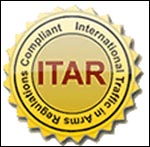 It has been a while since we’ve highlighted the ever popular press releases of companies touting their ITAR registrations as the best thing since ShamWows and Chia Pets. Today’s companies that will do the Part 122 walk of shame are Professional Aviation Associates and American Industrial Systems.
It has been a while since we’ve highlighted the ever popular press releases of companies touting their ITAR registrations as the best thing since ShamWows and Chia Pets. Today’s companies that will do the Part 122 walk of shame are Professional Aviation Associates and American Industrial Systems.
Take it away, Professional Aviation Associates:
Professional Aviation Associates, a Greenwich AeroGroup company announced it recently became International Traffic in Arms Regulations (ITAR) certified.
According to the Directorate of Defense Trade Controls (DDTC), the U.S. Government requires all manufacturers, exporters, and brokers of defense articles, defense services or related technical data to be ITAR compliant.
The ITAR certification allows Professional Aviation Associates to supply rotables to military aviation operators of both fixed wing and rotorcraft models, as well as parts and tooling to foreign militaries
Of course, the only thing that DDTC has “certified” for PAA is that PAA could figure out the names of its officers and directors, put them on a piece of paper and send them to DDTC with a check that didn’t bounce. All certifications should be this easy. I do hope that during this intensive certification process, PAA learned that it needs more than just its certification to supply “parts and tooling to foreign militaries.”
But today’s winner is American Industrial Systems:
American Industrial Systems Inc. (AIS), an ISO 9001:2008 certified supplier and manufacturer of rugged computer and display has announced completion of the International Traffic in Arms Regulations (ITAR) registration with the Directorate of Defense Trade Controls (DDTC). ITAR is a set of United States government regulations that control [sic] the export and import of defense-related articles and services on the United States Munitions List (USML). This registration, and with [sic] our commitment to ISO 9001 standards, documents AIS’s dedication to adhering to the strict regulations that control the export and import of defense-related services. AIS has proven their knowledge, understanding, and compliance to [sic] the US Department of States [sic] regulations in addition to the inclusion of defined corporate procedures and controls.
Well, I can tell you at least one subject that isn’t on the ITAR certification exam.

 Posted by
Posted by  Category:
Category: 

 According to an
According to an 
 A colleague brought back an interesting tidbit from the BIS Update Conference last week relating to one of the unresolved conundrums of the current export reform efforts. Under the currently proposed reforms, certain items on the United States Munitions List will be transferred to the Commodity Control List, which will transfer licensing jurisdiction over those items from the Department of State’s Directorate of Defense Trade Controls (“DDTC”) to the Department of Commerce’s Bureau of Industry and Security (“BIS”). That process is summarized in some detail in
A colleague brought back an interesting tidbit from the BIS Update Conference last week relating to one of the unresolved conundrums of the current export reform efforts. Under the currently proposed reforms, certain items on the United States Munitions List will be transferred to the Commodity Control List, which will transfer licensing jurisdiction over those items from the Department of State’s Directorate of Defense Trade Controls (“DDTC”) to the Department of Commerce’s Bureau of Industry and Security (“BIS”). That process is summarized in some detail in  On July 6, the White House signed a
On July 6, the White House signed a 

